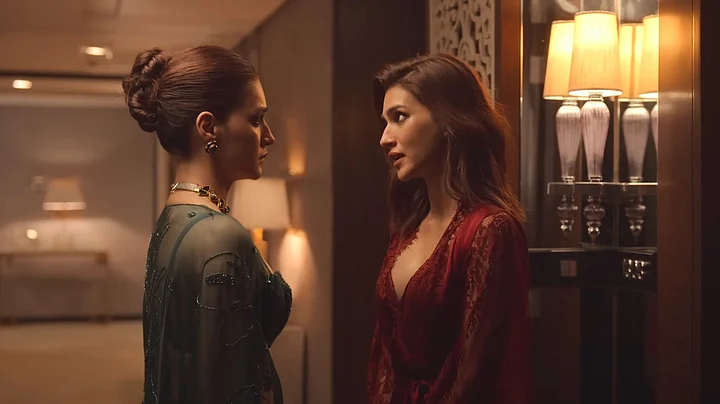Do Patti opens with a charged sequence – a woman screaming for help mid-air as the paraglider she is on sways dangerously in the wind. Once safely back on ground, she accuses her husband, who was on the paraglider with her, of trying to kill her. A cop Vidya Jyoti (Kajol) begins her investigation into this woman, Saumya’s (Kriti Sanon) life.
During her investigation, she discovers that Saumya and her twin sister Shailee have always been at odds with each other – having had two different reactions to a traumatic incident in their childhood, Shailee feels slighted by the adults in their life. They tend to flock around the more sensitive Saumya, effectively labeling her the ‘trouble child’. If there is one sentiment they agree on, it’s this: ‘I won’t lose to my sister’.
So when Shailee comes back into Saumya’s life right when she’s about to build a relationship with Dhruv (Shaheer Sheikh), things take a turn. Sanon’s double role, aptly described as ‘Seeta aur Geeta’ borrows from the film’s premise – Saumya is the more reserved, ‘demure’ twin while Shailee is brash and outspoken. Dhruv and Shailee seem to be instantly drawn to each other and Saumya can do nothing but watch.
However, all is not as it seems. VJ, acting like an extension of the audience, tries to answer multiple questions – Is there more to Dhruv’s relationships with the sisters than what meets the eye? How far will Saumya and Shailee go to ‘win’? And who is lying? In setting up these questions, the film’s first half stays engaging.
Kriti Sanon maneuvers her two roles with expert precision; both sisters have distinct body language giveaways and Sanon captures each shift and nuance well. The actor who stole the scene with a simple sequence in Teri Baaton Mein Aisa Uljha Jiya gets to explore a lot more of her skill in this film and she doesn’t disappoint. Her chemistry with Shaheer Sheikh’s ‘Dhruv’ as both Saumya and Shailee is distinct, and yet interesting enough, to keep you on your toes.
Kajol, who left people mesmerised with her performance in Lust Stories 2, tries to recreate that charm on screen here but is let down by a weak characterisation. Additionally, she seems to slip in and out of an accent that heightens the character’s inconsistency. The way the film weaves in her inner turmoil about choosing between word of law and the spirit of law doesn’t actually make a lot of sense. Sheikh as the entitled brat Dhruv makes your skin crawl – so that’s a mission well carried out.
Do Patti, however is let down by its screenplay – it isn’t nearly as taut or unpredictable as it needed to be. A thriller rests on the audience’s need and inability to figure out the next twist but in this film, you can see the twist coming a mile away. And that is partly because of the direction as well – the twist simply isn’t hidden well enough. Some sequences also seem to be too stretched out while others seem rushed. The best parts of Do Patti are hidden between the lines.
Unlike Seeta Aur Geeta, Shailee and Saumya are given a common love interest which allows the film to explore the misogyny that lies at the heart of the ‘Madonna-Whore complex’. The MWC trope presents two ‘types’ of women in cinema – one that is ‘pure’ and one that is ‘rebellious’. The former is desirable, especially as a romantic interest and the latter must change into the first to find redemption.
In Do Patti, the trope is used to highlight the role misogyny and his privilege play in the way Dhruv interacts with the two sisters.
The film, like Alia Bhatt & Shefali Shah-starrer Darlings, takes a nuanced approach to discussing themes like domestic abuse and intimate partner violence. The writing, courtesy Kanika Dhillon, imbibes the story with empathy – none of the characters are written, or expected to be viewed, with judgment.
Questions like ‘Why didn’t she just leave’ tend to overlook how complicated the dynamics can be in an abusive relationship and the film attempts to highlight that.
But, owing to a weak screenplay and the lapses in direction, Do Patti isn’t as effective as it could have and should have been. I found myself thinking of the Netflix mini-series Maid that focuses on a young woman’s attempts to leave an abusive relationship while trying to make a living to support her young child. The show is near-perfect in the way it tells her story and there are shades of the same in Do Patti but that’s where the depth ends. For the most part, it’s Sanon’s performance that keeps you hooked to the film.
Rating: 3 Quints out of 5
(At The Quint, we question everything. Play an active role in shaping our journalism by becoming a member today.)
